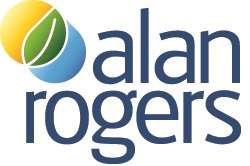Alan Rogers Guides
 Current logo (2011-present) | |
| Parent company | Caravan and Motorhome Club |
|---|---|
| Founded | 1968 |
| Founder | Alan Rogers |
| Country of origin | United Kingdom |
| Headquarters location | East Grinstead, Sussex |
| Publication types | Travel guides |
| Nonfiction topics | Camping, caravanning and motorhome holidays |
| Official website |
alanrogers |
The Alan Rogers Guides were started in Britain in 1968 by camp enthusiast Alan Rogers. The guides place utmost importance on the quality of the campsites; campsites cannot pay to be in the guide. Travel guides have been published every year (with the exception of 2017) since 1968. In 2018, Alan Rogers Guides celebrated its 50th anniversary.
How the campsites are chosen
The guides rely on a team of Site Assessors, all of whom are experienced caravanners or motorcaravanners, to visit and recommend parks. The popularity of the guides is based their impartiality and supported by the enthusiasm, diligence and integrity of the Site Assessors.
The most important criteria used when inspecting and selecting parks is quality. The Assessors consider and evaluate:
- The welcome
- The pitches
- The sanitary facilities
- The cleanliness
- The general maintenance
- The location
The guides try to cater for a wide variety of preferences; from those seeking a small peaceful campsite in the heart of the countryside, to visitors looking for an 'all singing, all dancing' park in a popular seaside resort.
History

The first guide (Alan Rogers' selected sites for caravanning and camping in Europe) sold for four shillings (20p). In the introduction to the first guide Alan wrote "I would like to stress that the camps which are included in this book have been chosen entirely on merit and no payment of any sort is made by them for their inclusion."
Alan Rogers continued to expand until 1986 when Alan Rogers, aged 70, decided to seek retirement and the publishing company, then known as Deneway Guides and Travel Ltd, was sold to close friends of Rogers'. The Mark Hammerton Group acquired the company in 2001 shortly after Alan Rogers' death just a year earlier.
Clive Edwards, who purchased the company in the mid 1980s, remembers the negotiations with Alan Rogers clearly. "The actual business negotiations were conducted quickly. What Alan was really concerned about was that we would maintain the philosophy and the impartiality of the Guides. Following Alan's retirement we found that he was always willing to offer us advice and guidance".
In 2004 the business moved to its current premises in the Kent countryside.
The Mark Hammerton Group was acquired by Caravan and Motorhome Club under the brand Alan Rogers Travel Group along with its subsidiary company Belle France. The guides continue to recommend campsites based on strict criteria and independent assessments. Sites are added where appropriate and removed if standards have fallen.
Success
The guides have been influential in the rise in popularity of camping; for example, drawing attention to the number of overseas sites that were providing mains electricity hook-ups. Alan Rogers suggested that British caravanners and motor caravanners should take advantage of this by having their units wired to take mains electricity; in 1968 no standard British caravan was supplied with mains electricity wiring.
One measure of the guides' success is that many of the things he called for in the original guide have now become reality:
- Mains electricity connections in caravans and motor caravans
- Marked pitches of a minimum size
- Hot water freely available in the amenity blocks
- British style toilets on French campsites
- The use of trees and bushes to mark pitches
- An end to the practice of over-crowding of sites during the peak summer holiday times
Many of the sites personally recommended by Rogers' in 1968 - are still recommended in the current guide.
External links
- alanrogers.com - Official website for the guides
See also
References
- Cordee - Britain and Ireland Guide for sale